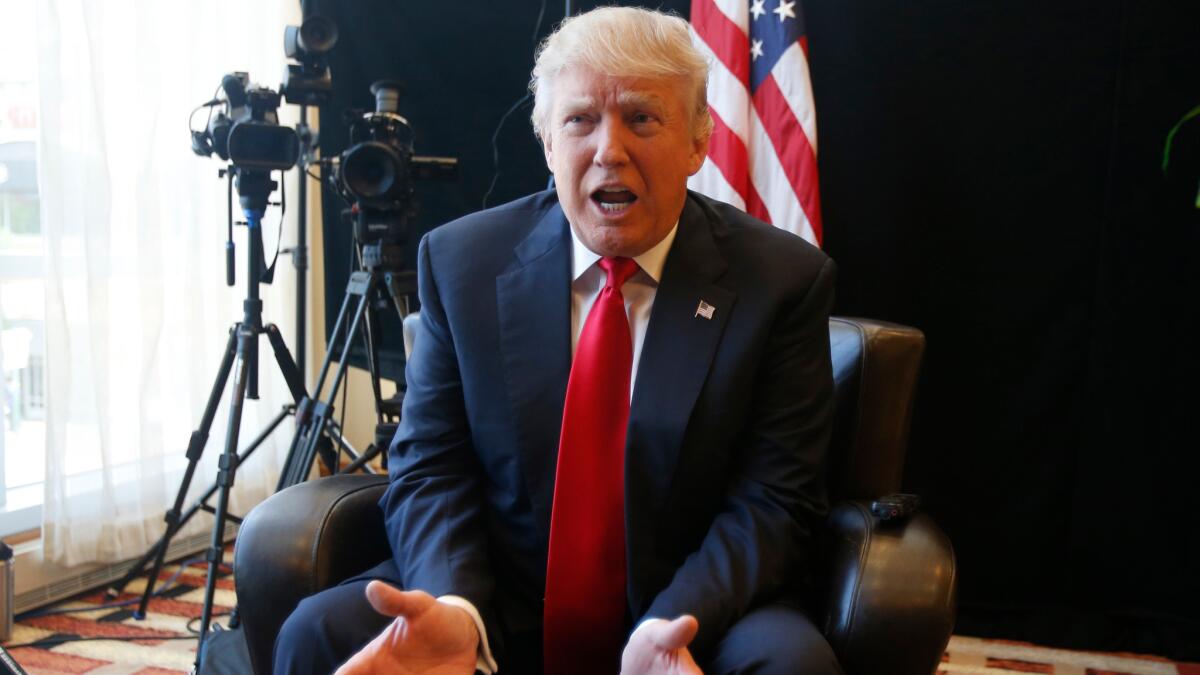Op-Ed: Donald Trump is what happens when the media choose ideology over facts

- Share via
Fact-checkers have weighed in time and again on the Trump campaign, and – no surprise here — Donald J. Trump doesn’t tell the truth. Politifact rates 70% of his statements as somewhere between “mostly false” and “pants on fire.” CNN has taken to checking his speeches in real time, flashing corrections on the chyron as he talks.
Yet Trump and his supporters remain undaunted. His ability to repeat false statements with seemingly few consequences has become a point of political pride, a middle finger raised to anyone who argues that facts are real and that they matter.
The large number of Americans cheering that middle finger didn’t just wake up one morning and decide to reject reality out of hand. Their tolerance for truthiness over truth is the result of a decades-long process, one founded in conservatives’ legitimate concerns about flaws in journalistic objectivity and suspicions about media biases. Incorporating ideology helped the right create a space for conservative ideas in the news. But over time, as ideology became conservatives’ sole measure of media trustworthiness, facts didn’t stand a chance.
Our post-factual era traces back to the 1940s and 1950s, when conservatives found themselves shut out of the halls of power. Some were exiled for their opposition to World War II, some for their opposition to moderate Republican president, Dwight Eisenhower, and still others for their support of Sen. Joseph McCarthy’s Red Scare inquisitions. Whatever the cause, by the mid-1950s neither political party was inclined to pay much attention to conservatism’s proselytizers.
The outcasts didn’t solve their problem by starting a new party, however. They solved it by launching new media. Periodicals such as Human Events and National Review, publishing houses such as Regnery and Devin-Adair, radio shows such as the Manion Forum and the Smoot Report all were founded to counter the anti-conservative bias of existing media.
The writers, publishers, editors and broadcasters behind the new outlets all leveled the same charge: “Liberal media bias” made it impossible for the public to be accurately informed. That phrase is so pervasive now it’s hard to imagine a time when it carried the shock of novelty. But 50 years ago, it was a near-blasphemous affront to journalists who clung fast to the idea of objectivity. For reporters at major newspapers and networks, objectivity was a worldview as well as a set of professional standards. The quality of reporting was judged by its realism: How well did it conform to actual observable events?
Mainstream journalists recoiled at open displays of ideology, whether left-wing or right-wing. They treated the emerging conservative movement and its agendas with suspicion. A piece in the New York Times in 1961, for instance, failed to differentiate between National Review and the American Nazi Party, suggesting all right-wing organizations were equally suspect.
Articles like that only proved to those on the right the need to balance the news with conservative views. Yet although their media enterprises would be openly right-wing, conservatives also understood that objectivity had real political and cultural power. So conservatives claimed — and even tried — to be guardians of objectivity as well.
This is how Human Events, a conservative newsweekly, described its mission in the early 1960s: “In reporting the news, Human Events is objective; it aims for accurate representation of the facts. But it is not impartial. It looks at events through the eyes that are biased in favor of limited constitutional government, local self-government, private enterprise, and individual freedom.”
To some degree, it worked. Conservative radio shows and magazines blurred the line between opinion and reporting, but because they wanted to compete with and be part of the larger media landscape, they presented and dissected the same facts as everyone else. Conservative outlets operated much like the partisan papers of the 19th century: with open bias and straight reporting sitting side by side.
The tension between objectivity and ideology would come to define conservative media, up to an including “Fair and Balanced” Fox News. Like Human Events, Fox wanted to be trusted as a news source because it was right and right wing. Unlike Human Events, Fox (and other second generation conservative media) was becoming profitable and popular. Its brand of entertainment, politics and commerce stoked and benefited from partisanship above all.
A more powerful conservative media (and movement) stopped knocking at the mainstream’s door. It constructed a wholly contained, self-referential system: Bill O’Reilly cited Rush Limbaugh citing the Weekly Standard citing the Heritage Foundation. If a few of the facts were in dispute, well, the point was still right.
Except when it wasn’t. Writing after Mitt Romney’s loss in the 2012 presidential campaign, David Frum, former speechwriter for President George W. Bush, argued that conservatives had deluded themselves that their candidate was winning because their media had trapped them in a system of misinformation. Good for movement cohesion and organized outrage, not so good at reckoning with the real world.
Now conservatives, or at least the Republican Party, have doubled-down on post-factualness with Trump. Neither right nor especially right-wing, Trump has been able to triumph because of how thoroughly Fox and company have muddied the line between facts and opinion. If they want the GOP back, conservatives will need to recommit to reality.
Nicole Hemmer is the author of the just published “Messengers of the Right: Conservative Media and the Transformation of American Politics” and an assistant professor at the University of Virginia’s Miller Center.
Follow the Opinion section on Twitter @latimesopinion and Facebook
MORE OP-EDS
Is Obama a master of trolling?
Democrats should worry, not panic
Could a Clinton presidency unleash a post-gender society? Not a chance.
A cure for the common opinion
Get thought-provoking perspectives with our weekly newsletter.
You may occasionally receive promotional content from the Los Angeles Times.






